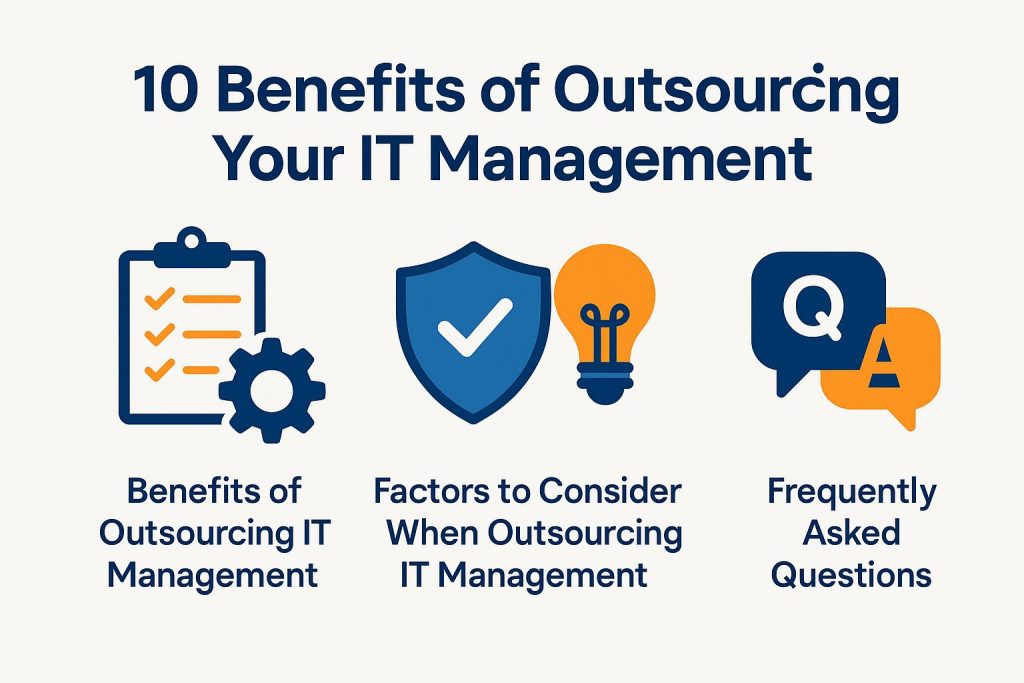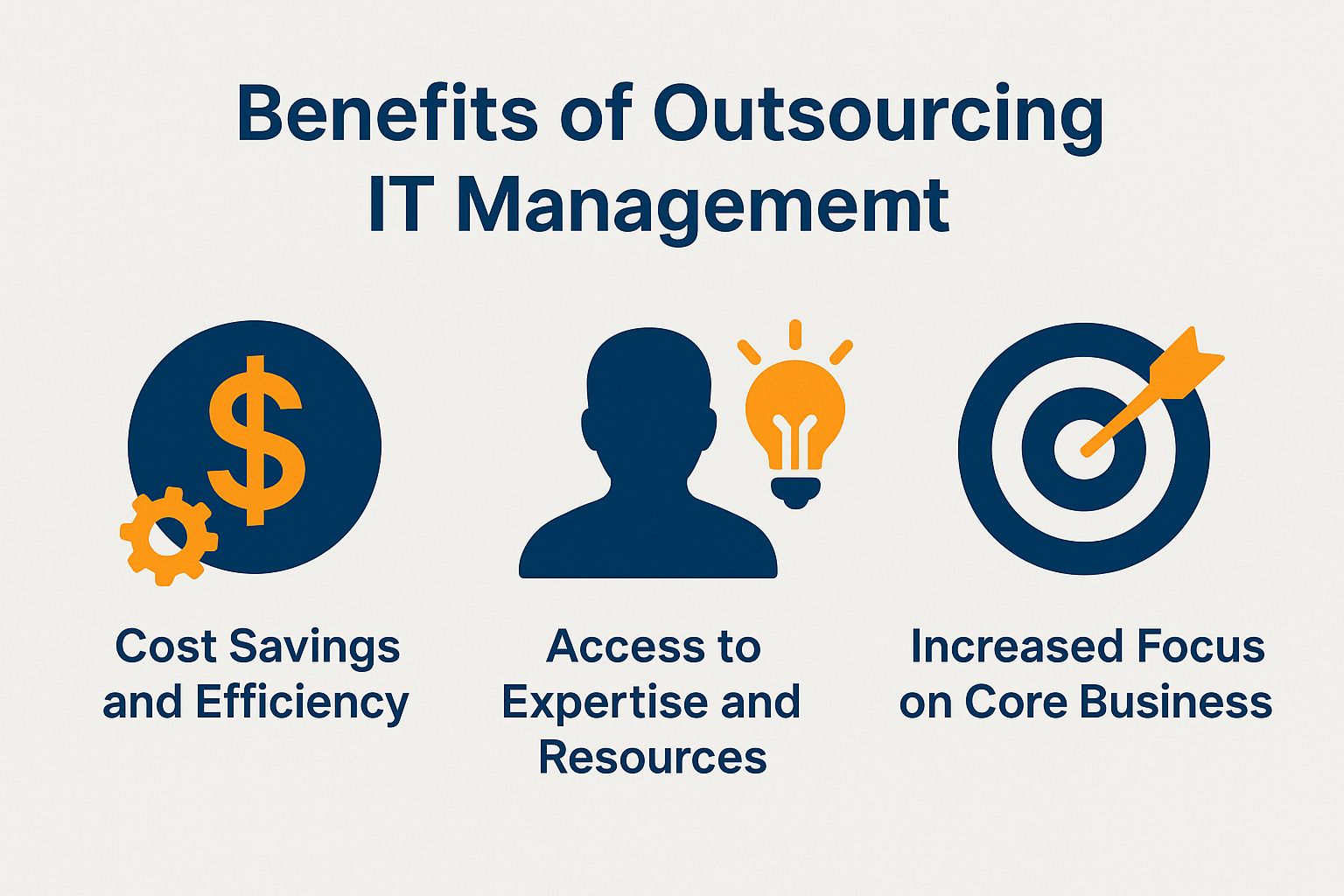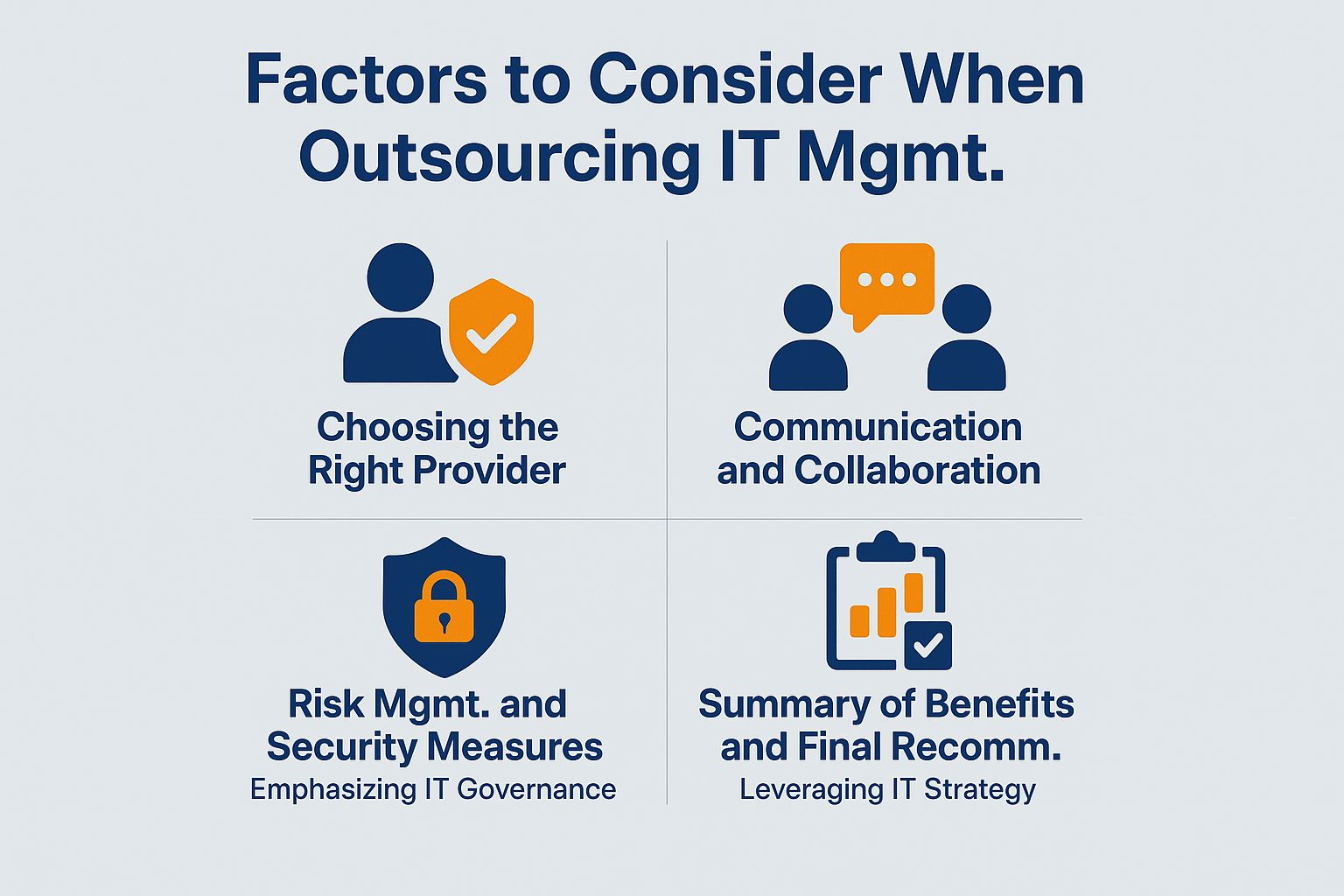10 Benefits of Outsourcing Your IT Management

Outsourcing IT management helps companies improve efficiency and save money. This article discusses the benefits of outsourcing. These benefits include cost savings, specialized expertise, and focus on core business goals. It also highlights key factors for choosing an outsourcing provider. These include good communication and strong security measures. Outsourcing can transform IT operations. This helps organizations grow and improve their business.
Explanation of IT Management and Outsourcing
IT management involves strategies and practices to manage technology resources. It includes planning, implementing, and controlling IT strategies to meet business goals and improve efficiency.
Outsourcing IT management means hiring third-party providers for IT functions. This allows businesses to focus on core operations and improve security. This creates a partnership. Organizations can use outside expertise to improve IT and overall performance. Given the rapid advancement of technological trends and the rise of digital transformation, outsourcing has emerged as a critical component of modern business strategy.
At its core, IT management aims to optimize the performance of technology systems to support organizational growth and innovation. Effective IT management helps businesses respond quickly to market changes. This improves agility and provides a competitive edge.
Moreover, outsourcing IT management reduces costs. It also gives access to specialized skills and advanced technologies that are hard to develop in-house. This combination of internal and outsourced functions creates flexibility. It helps businesses adapt to changes and promotes sustainability through business continuity.
Benefits of Outsourcing IT Management
Outsourcing IT management has many benefits. It can improve an organization’s operations and performance.
Key advantages are cost savings. Businesses can lower labor and operational costs by using third-party IT vendors.
Furthermore, outsourcing also improves efficiency. It allows organizations to focus on core functions while accessing technology expertise. This strategy helps with budget management and improves operational control. It reallocates resources to critical areas, leading to better financial benefits and flexibility.
Outsourcing also lowers operational costs, like software licenses, infrastructure, and technology upgrades.
For example, a business can cut operational costs by up to 30% by outsourcing help desk support. External providers can offer 24/7 support and save money. Learn more about how managed IT services can enhance efficiency and productivity.

Cost Savings and Efficiency
One of the most compelling reasons organizations opt to outsource IT management is the significant cost savings and improved cost efficiency it can provide. By engaging third-party service providers, companies can effectively reduce overhead costs associated with hiring, training, and maintaining an in-house IT team, thereby enhancing employee productivity.
This strategy not only facilitates better budget management but also enhances operational control by reallocating resources to critical business areas, ultimately leading to improved financial benefits, operational flexibility, and overall efficiency.
Along with wage savings, outsourcing can markedly decrease operational expenses, including costs related to software licenses, infrastructure investments, and technological upgrades.
For example, a business can achieve up to a 30% reduction in operational costs by outsourcing help desk support services, as external providers often benefit from economies of scale and offer 24/7 support. This arrangement allows organizations to access advanced technologies and skilled professionals without the substantial costs associated with direct employment.
Outsourced teams offer flexibility. This helps businesses quickly adapt to market changes. It leads to cost savings and improves competitiveness.
Access to Expertise and Resources
Outsourcing IT management gives organizations access to expertise and resources not available internally. By partnering with specialized vendors, businesses can use the latest technology trends and tap into a global talent pool.
This approach enhances resource management. It also helps in knowledge transfer. This keeps companies at the forefront of innovation and competitive advantage in their respective industries.
In a fast-changing technology landscape, relying only on internal teams can limit a company’s ability to adapt and grow. Embracing external expertise accelerates project timelines and introduces new perspectives that can drive creative solutions.
Accessing specialized knowledge through outsourcing fosters a culture of technology innovation, allowing organizations to concentrate their internal resources on core business functions while benefiting from the advanced competencies of external partners.
Equally important, this strategic approach to talent acquisition helps firms stay flexible and responsive to market changes. It promotes resilience and business agility in an ever-changing environment.
Increased Focus on Core Business
Outsourcing IT management helps organizations focus on core business operations. This leads to better productivity and efficiency across all departments.
This strategic decision allows for the reallocation of valuable resources, enabling teams to concentrate on their primary objectives and enhance overall service delivery. With IT functions managed externally, companies can also achieve seamless technology integration, which results in better alignment between IT capabilities and business strategies.
Such a shift not only streamlines processes but also equips organizations with the latest technological advancements without the burden of additional in-house system maintenance.
Organizations can leverage the expertise of specialized IT service providers who introduce innovative solutions and best practices. This collaboration fosters an environment where teams can respond more swiftly to market changes, optimize business processes, enhance customer experiences, and drive growth.
Ultimately, the deployment of outsourced IT management changes operations. It optimizes resources and helps businesses stay competitive and agile in a fast-paced digital economy.
Factors to Consider When Outsourcing IT Management
When organizations think about outsourcing IT management, they must assess key factors that impact the success of the partnership.
A key consideration is vendor management. This ensures the service provider aligns with the organization’s goals and values.
Furthermore, establishing clear service level agreements (SLAs) is vital to define expectations and performance metrics. Compliance with industry standards and regulations should also remain a top priority.
Regular performance monitoring is essential to uphold quality assurance standards and ensure that the outsourced services contribute positively to business outcomes. As mentioned in our overview of how managed security services protect digital assets, maintaining robust security protocols is crucial for safeguarding the organization’s information.

Choosing the Right Provider
Choosing the right provider is crucial for successful IT outsourcing. It directly influences service quality and operational control. Organizations should evaluate potential vendors based on their expertise, experience, and capability to deliver comprehensive enterprise solutions and technology consulting tailored to specific business needs.
Establishing strong vendor relationships founded on trust and communication is vital, as it ensures that the provider can effectively support the organization’s objectives and contribute to enhancing overall performance.
Organizations must investigate the methodologies employed by potential IT management providers to assess their problem-solving approach and adaptability in dynamic environments. It is also important to review case studies or client testimonials that highlight previous successes and innovation capabilities, and conduct thorough vendor analysis.
Organizations must evaluate the provider’s track record on service quality. This includes performance monitoring and compliance with industry standards.
Communication and Collaboration
Good communication and collaboration are essential for successful IT management outsourcing. They build strong relationships between organizations and service providers.
Clear communication and collaboration tools improve efficiency. They allow for seamless remote support and workflow automation. This proactive approach ensures that both parties remain aligned on objectives and can promptly address any issues with comprehensive incident management that may arise during the outsourcing relationship.
Structured communication strategies reduce misunderstandings. They promote transparency and accountability. Organizations can implement regular check-ins and leverage project management platforms for effective IT governance to keep all stakeholders informed and engaged.
An open culture encourages teams to share feedback, leading to continuous improvement in processes through effective IT management and agile methodologies. By investing in training for both in-house and outsourced teams, organizations can bridge skill gaps, foster better collaboration, and enhance adaptability in a rapidly changing environment. The importance of integrating these methodologies is further underscored by their proven impact on reducing downtime and boosting productivity through managed IT services.
This level of seamless integration is crucial for maintaining competitiveness in today’s fast-paced digital landscape.
Risk Management and Security Measures: Emphasizing IT Governance
Robust risk management, IT governance, and security measures are essential for organizations outsourcing IT management. They protect sensitive data and guard against threats.
This means following strict cybersecurity protocols and compliance standards. Organizations must also have IT policies and disaster recovery plans to mitigate risks associated with data breaches and service interruptions. By prioritizing these measures, organizations can ensure that their outsourced IT functions remain secure and resilient, thereby maintaining customer trust and ensuring business continuity.
As reliance on outsourcing partners for IT services continues to grow, understanding the implications of risks becomes increasingly vital. Companies must take proactive steps to evaluate and select partners that not only possess advanced security features but also demonstrate compliance with industry regulations.
Emphasizing a culture of accountability ensures that every aspect of the outsourced relationship is scrutinized, from data handling practices to incident response protocols and IT budgeting.
Consequently, organizations can confidently navigate the complexities of the digital landscape, establishing a robust framework that not only protects their operations through data backup and network security but also enhances stakeholder confidence. For those interested in saving costs while outsourcing IT management effectively, consider exploring strategies like smart IT outsourcing.
Summary of Benefits and Final Recommendations: Leveraging IT Strategy
Outsourcing IT management has many benefits. It can improve an organization’s operational efficiency and access to talent, leading to business growth. The advantages are evident, including cost savings, access to specialized expertise, and an increased ability to focus on core business functions.
Organizations can form strategic partnerships with trusted vendors. This ensures flexibility and scalability in IT operations. To fully leverage these benefits, it is crucial for companies to carefully assess potential providers and implement effective communication, risk management, and performance monitoring strategies.
Outsourcing lets businesses access the latest cloud technologies without high upfront investments. Utilizing specialized external resources allows firms to streamline their processes and benefit from enhanced security protocols that top-tier IT vendors typically offer.
Maintaining open lines of communication with selected partners and virtual CIOs is essential for organizations, as it ensures alignment of objectives and allows for the adaptation of strategies when necessary. Ultimately, embracing outsourcing can enhance competitiveness in the market, making it an attractive option for firms looking to navigate the complexities of today’s digital landscape.
Outsourcing offers a range of clear benefits. By reducing costs and increasing access to expert knowledge, it empowers businesses to focus more effectively on their core activities. These combined advantages make outsourcing a vital strategy for optimizing IT management.
Frequently Asked Questions
What are the top 10 benefits of outsourcing your IT management?
The top 10 benefits of outsourcing IT management are: 1. Cost savings. 2. Increased efficiency. 3. Access to specialized expertise. 4. Improved cybersecurity. 5. Enhanced scalability. 6. Reduced risk. 7. Better disaster recovery. 8. Streamlined processes. 9. Improved focus on core business. 10. Increased flexibility.
How can outsourcing IT management help with cost savings?
Outsourcing IT management helps save costs in several ways. For example, it eliminates the need for expensive technology investments. Additionally, it reduces overhead by minimizing in-house infrastructure expenses. Furthermore, businesses can benefit from lower labor costs by partnering with providers in more cost-effective regions.
What is the role of specialized expertise and strategic partnerships in IT outsourcing?
Outsourcing IT management gives businesses specialized expertise. This includes network security, cloud computing, and software development. It also allows for strategic partnerships. Businesses avoid the need to hire and train in-house staff.
How does outsourcing IT management improve cybersecurity and infrastructure management?
Outsourcing IT management to experts ensures your business has effective cybersecurity measures. This protects sensitive data from threats and attacks.
Can outsourcing IT management help with scalability?
Outsourcing IT management allows businesses to easily scale their IT needs. They can scale up or down without high costs or the complexity of hiring new staff or buying new equipment.
What risks can be reduced by outsourcing IT management and effective risk assessment?
Outsourcing IT management reduces technology risks. This includes risks like system failures, security breaches, and data loss. A dedicated team of experts monitors and manages these risks.




